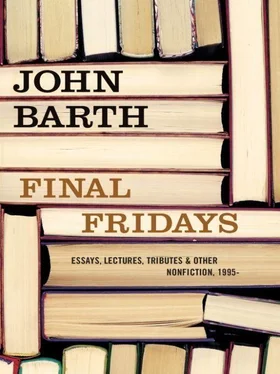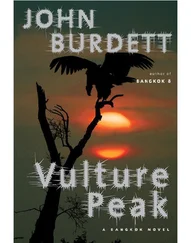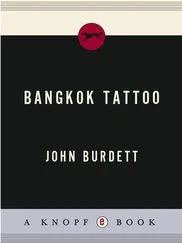We thank you for that, Mr. Schneider. And even more we thank you , John Updike, for being the miracle that you were — and will remain.
The Judge’s Jokes: Souvenirs of My Father, the After-Banquet Speaker 1
— cornflakes in washing machine / coon hound
—“Living Bra”? What’ll you feed it?
—“I never kissed the Blarney Stone; I only sat on it.”
MY FATHER, WHOSE first and last names I share — John Jacob “Whitey” Barth (1894–1980), late of Cambridge, on Maryland’s lower Eastern Shore — was himself the fifth of six children: four girls and two boys born in the 19th century’s closing decades to a German immigrant stone-worker and his wife. Having crossed from Bremerhaven to Baltimore and found both employment and a bride in that city’s populous German-immigrant community, Herman Wilhelm Barth then crossed Chesapeake Bay with her to Cambridge and established himself there in the tombstone trade. His older son and namesake, evidently the favorite, aspired beyond his father’s craft: Re-crossing the Bay after high school to study sculpting at the Maryland Institute of Art, young Herman (his middle name Englished from “Wilhelm” to “William”) filled his parents’ East Cambridge house with plaster replicas of classical and Beaux Arts statuary, just when International Modernism was hitting the American scene in the 1913 Armory Show. Whether he would have been influenced by that radical new aesthetic, we’ll never know: In World War I he went to France with the AEF to fight his father’s fatherland and died there in the great flu pandemic of 1918, two months before the Armistice.
In contrast to Herman’s ambition (and parental support, presumably: the Maryland Institute is not tuition-free, and few youngsters in that place, time, and class went off to higher education), his kid brother’s was less lofty. As a small boy helping out in the stoneshop, my dad was put to work polishing a flat slab of marble with a piece of railroad iron; as he would tell the story later, chuckling, to his own children, he managed to mash a finger, was sent home crying, and never went back, at least not to apprentice himself to his father’s and elder brother’s trade. At age 16, for reasons never explained to us (but I don’t recall our ever asking for explanation), he dropped out of high school and went to work in a little candy-and-soda shop a few blocks from home, near the bustling crab-and-oyster processing plants on the creek that divided East Cambridge from the town’s business section and other residential wards. In 1917 he too enlisted, and spent the war years as a ground-crewman in the Army’s fledgling “Aviation Section”—but he got no farther from his home town than Langley Field in nearby Virginia, and upon his discharge was content to come back to the bereft family homestead (where he was now the Only Son) and his former employment.
In which, unglamorous as it was compared to Art, he did well — and who knows whether his sadly short-lived brother would have scored as a sculptor or wound up carving tombstones like his dad? Having mastered as a teenager the ins and outs of the candy and soda-fountain business, in his and the century’s twenties my father set up shop for himself, first as a wholesaler (his earliest printed stationery, now browned and crisped with age, is headed JOHN J. BARTH , Wholesale High Grade Chocolates and Specialties, Cambridge, Md ) and soon after as a retail shopkeeper in his own soda-fountain/lunchroom /candy-store “uptown” on Race Street, the town’s main business section. His later letterheads read WHITEY’S , John J. Barth, Cambridge, Md , and in time JOHN J. BARTH , Fine Candy Since 1922, Cambridge, Md. In addition to Whitman’s Chocolates and assorted other candies, the store featured Dolley Madison ice cream, sundaes and sodas (no bottled drinks), cold sandwiches made at the counter (he didn’t like cooking-odors on the premises), and soups made at home by our mom and reheated at the store on a small backroom stove. But the showcases of candy (mainly chocolate) were his chief interest: The business’s name was Whitey’s Candyland, but everybody called it simply Whitey’s.
Whitey’s ? On Race Street? In the then totally segregated South?
Race Street, Cambridge MD, 1936, with Whitey’s sign near center.

We’ll get to that — though I don’t recall our ever asking whence the nickname, either, which he carried from boyhood. Meanwhile it’s 1922: The young shopkeeper meets and marries a local young milliner working in a hat-shop a few doors down from the Candyland; they move into a two-story white clapboard house next door to his parents, one block from the broad Choptank River and the hospital where over the next several years their children will be born, and where nearly 60 years later, still a resident of that house, at age 85 he’ll breathe his last. Through the intervening half-dozen decades, despite a youthful sinus infection that in those pre-antibiotic days left him severely hearing-impaired for the rest of his life, he thrived in the small town and marsh-rich rural county that he had no interest in leaving (told by his doctor that the only hope for relief from his chronic sinusitis was a less humid climate, Dad replied that he’d rather be sick on the Eastern Shore than healthy anywhere else). He was gregarious, outgoing, and community-spirited: In addition to storekeeping from morning till night six days a week every week of the year, he served as an elected judge of the Dorchester County Orphans Court every Tuesday afternoon for a record-breaking 44 years, was a devoted member of the town’s volunteer fire company as well as an organizer of similar companies in the county’s smaller towns, and an American Legionnaire who not only marched with his fellow veterans in Cambridge’s annual Armistice Day parade but became the chief organizer of those elaborate events. By comparison to his life, mine (literary and academic) seems almost reclusively detached, its radius much wider but its roots — in serial dwelling-places from Pennsylvania and upstate New York to Maryland and south-west Florida — less deep.
Because those volunteer fire companies, understandably, are tightly bonded social clubs as well as indispensable community-service outfits, in addition to their weekly meetings they have members-only banquets and fund-raising public barbecues and ham-and-oyster suppers. It was as the jocular after-dinner speaker at those banquets, in a dozen-plus venues around the county — his own beloved Rescue Fire Company and those others he’d helped organize — that Judge Whitey came into his own as an entertainer, in demand year after year: never a clown, but a humorist locally renowned for his joke-telling from at least the early 1940s until his death in February 1980, just a month before his scheduled appearance at the RFC’s 37th Annual Memorial Banquet.
Rescue Fire Company, Cambridge, MD, 1938.

— Doctor to patient: Your check came back. Patient: So did my arthritis.
— honeybee & horsefly / turnip in mouth / chicken with legs crossed / shad roe
My siblings and I, alas, never got to see our father do his number. Nor did he often tell jokes at home, where our conversation was typically good-humored but, owing at least in part to his deafness, seldom extended or really “personal”: witness those unasked questions about his nickname and his dropping out of high school. It was only as we went through his effects post mortem, in our middle age, that I found two small notebooks of handwritten joke-cues and 14 age-browned Whitey’s Candyland envelopes containing more of the same on notepad-sized separate sheets and bearing the month and day, but seldom the year, of an upcoming gig and its location: C’bge RFC, Taylors Island, Hoopers Island, Church Creek, Lakes & Straits, Neck District. Some held a single sheet of perhaps nine cues; others five or six sheets with as many as 45 cues, occasionally annotated with a check, an X, or the word used . At times, evidently, he would “go around the table,” naming his firehouse comrades and addressing a joke to each (name followed by cue). In all, more than 200 jokes, fewer than half of them written out in full. While free of profanity, about three-quarters of them by my rough count are more or less ribald teasings of romance, courtship, marriage, infidelity, divorce, male and female anatomy, or some other aspect of sex (though a man of impeccable virtue, the Judge was not strait-laced):
Читать дальше














